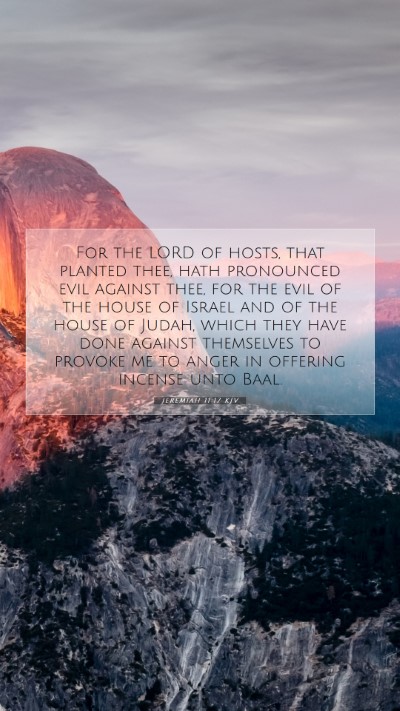Understanding Jeremiah 11:17
Jeremiah 11:17 states, "For the Lord of hosts, who planted you, hath pronounced evil against you, for the evil of the house of Israel and of the house of Judah, which they have done against themselves to provoke me to anger, in offering incense unto Baal."
This verse carries a profound meaning that involves themes of divine judgment, covenant unfaithfulness, and the consequences of idolatry. The insights can be derived from various public domain commentaries.
Summary of Biblical Meaning
In this context, God is depicted as the gardener who has painstakingly planted His people, Israel and Judah. Despite this nurturing, the people have turned to idolatry, particularly the worship of Baal, which is deemed as a significant betrayal of the covenant established with Yahweh.
Commentary Insights
-
Matthew Henry:
Matthew Henry emphasizes the serious nature of provoking God to anger through idolatry. He explains that the phrase "pronounced evil" reflects God's righteous displeasure over the actions of His people. The act of offering incense to Baal symbolizes the rejection of divine authority and a grave spiritual error that leads to national calamity.
-
Albert Barnes:
Albert Barnes elaborates on the consequences of their actions, highlighting that the evil pronounced isn't a random judgment but a direct result of their misdeeds. He indicates that such actions were initiated by the leaders among them and have far-reaching implications for the entire nation. Barnes points out that this serves as a warning against the folly of turning away from God and the dire outcomes of rebellion against divine commandments.
-
Adam Clarke:
Adam Clarke provides historical context, noting the prevalence of Baal worship in ancient Israel and its implications. He underscores God's role as a righteous judge who holds His people accountable for their actions. Clarke elucidates that the language used in this verse suggests a time of reckoning where divine justice is inevitable due to the persistent unfaithfulness of the people.
Key Themes and Lessons
Here are some key themes highlighted in the verse, reflecting broader teachings within Scripture:
- Covenant Unfaithfulness: The Israelites’ turning to Baal represents a breach of their covenant with God.
- Divine Judgment: The "evil pronounced" serves as a reminder of the consequences of sin.
- Idolatry: Worshipping foreign gods leads to spiritual death and national consequence.
- Divine Care: Despite their failures, God’s initial act of planting them shows His love and desire for their prosperity.
Applying Jeremiah 11:17 Today
For modern readers, the verse calls for introspection regarding faithfulness to God. It urges individuals and communities to evaluate their spiritual priorities and the influences that may lead away from divine fidelity. It can serve as a teaching point in Bible study groups and is significant for online Bible study discussions.
Additional Bible References
- Hosea 4:6 - God's people are destroyed for lack of knowledge.
- Ezekiel 14:6 - God calls Israel to repentance from their idols.
- Exodus 20:3-5 - The commandments against idolatry and the consequences for unfaithfulness.
Resources for Further Study
To deepen your understanding of Scripture, consider utilizing various Bible study tools and Bible study resources available through study guides and online platforms. Engaging with Bible study courses or materials that focus on historical and cultural contexts can offer profound insights into difficult passages.
Conclusion
Jeremiah 11:17 serves as a powerful reminder of God's holiness, the seriousness of divine covenants, and the perils associated with idolatry. Understanding its implications through various commentaries enhances our grasp of its significance and encourages practical application in our daily lives.


